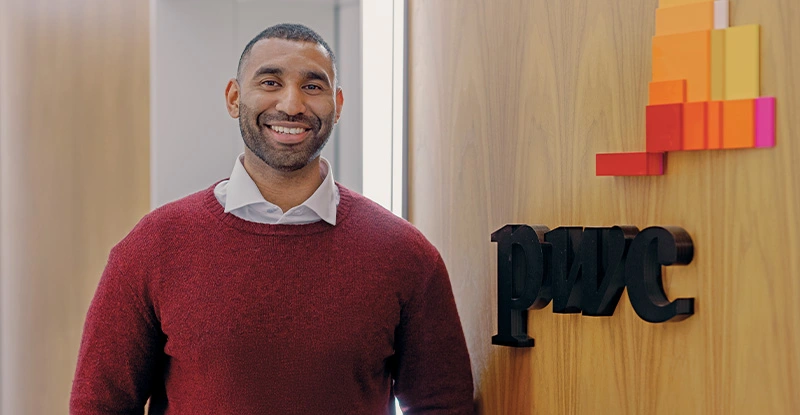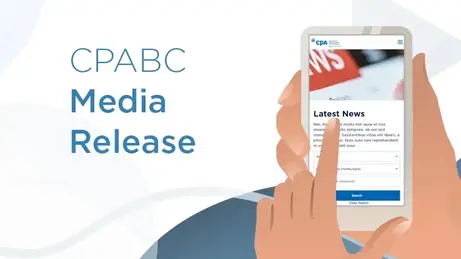
Equity, diversity, and inclusion are more than just buzzwords—they’re key to building stronger organizations and better leaders. Still, these initiatives have always had their detractors, and it’s impossible to ignore the recent backlash against EDI south of the border.
With all of this in mind, we reached out to a CPA who’s active in EDI initiatives to talk about the challenges and benefits of creating a culture where everyone feels welcome.
Henry Flowers, CPA, is a senior manager in risk services at PwC Canada and the national co-chair of PwC’s Black Professionals Inclusion Network (he also holds leadership roles with ISACA Vancouver and the KPU Alumni Association).1 Kim Taniguchi, a communications specialist at CPABC, recently interviewed Henry for the Coffee Chats with CPABC podcast series. In the episode, they discussed his career journey, his involvement in EDI initiatives, and his advice for the next generation of professionals. This article focuses on EDI.
Kim: You help clients navigate governance, risk, and compliance challenges, including SEC requirements and establishing governance frameworks for AI. Can you tell us a bit about your role?
Henry: It feels a bit clichéd to say this, but I think a constant in my job is trying to be the best communicator and facilitator I can be. I try to create the best experience for clients and teams, and I feel like communication is a key conduit for that. And then I get a lot of joy in facilitating the execution of our strategic imperatives to ensure that things are moving smoothly, and in providing inputs on next steps.
With the risk services team that I’m on now, I’m focused on both assurance and technology. It’s about understanding how the technology can be utilized and also where it could go wrong.
Kim: How do you leverage your CPA skills?
Henry: In terms of how I use my designation, I like the idea of the CPA mindset and the structured framework it describes, because it’s one that you can apply both professionally and personally. It benefits me not only in the way I’m able to think, but also in the way I’m able to streamline my communications to both clients and my team.
Also, in terms of leverage, there’s a bit of confidence that comes from having the CPA designation. When we go through a proposal process, they’ll ask for credentials; being able to say, “Yes, I have that”—it imparts some confidence in my abilities. And it’s something that has emboldened me to take on more challenges, especially within the field of risk services.
Kim: Confidence is also tied to a sense of belonging, so let’s talk about that. What inspired you to take on leadership roles in the EDI space?
Henry: It came out of a spirit of wanting to be part of something bigger than myself, because I’ve been big on the idea of collectivism for a while. When I joined PwC (in September 2019), there was already a lot going on around advocacy for change—what I viewed as trying to shed light on the many shades of the human experience—and I felt that the opportunity to help people feel more included within this world we shared was something I wanted to prioritize. And I found that as I got involved, I had a lot of ideas to share, which naturally led to discussions about becoming even more involved. And I said yes.
Kim: Can you tell us a little bit about PwC’s Black Professionals Inclusion Network (BPIN)?
Henry: Absolutely. BPIN has been around since the early 2010s. It was originally only in Toronto and then expanded into other regions in 2020, which is when I learned about it. In terms of my involvement, I recently said yes to stepping up as a national co-chair, having previously served as co-chair for Western Canada.
BPIN’s role has definitely changed over time, but it’s always been centred around building engagement within the community for our members and allies and for facilitating opportunities for knowledge sharing and personal and professional development across the base. We also try to foster relationships with other Black professional organizations in the community, such as the Canadian Association of Black Lawyers and the Black Business Association of BC.
It’s been great to connect with all of these different organizations and share our skill sets and resources. At the heart of our collaboration is the idea that we can go further in our endeavours by working together.
Kim: What has it meant for you personally and professionally to be part of BPIN?
Henry: It’s meant a lot. It’s led to me developing some amazing relationships both within PwC and outside of PwC. And it’s definitely given me a new lens on the Black diaspora. I have an Afro-Caribbean father, but I wasn’t part of that community growing up. The sense of familiarity I get when I connect with others from the Caribbean now is definitely enriching. I can say “wha-g’waan” (slang for what’s up) and they know what I mean. And going back to what I was mentioning earlier, ultimately, it’s rewarding to feel like I’m contributing to a collective experience and hopefully adding at least a little more joy to others’ lives.
Kim: BPIN is just one of 14 different inclusion networks launched by PwC. What does it mean to you that the firm has made this kind of commitment to EDI?
Henry: Personally, I love it. I appreciate the commitment the firm has shown to all these initiatives. We recently underwent a global rebranding underpinned by the slogan, “So You Can.” In that spirit, the firm’s EDI efforts have enabled me to learn more about the values of my team and the challenges they face. In turn, this has allowed me to apply a more holistic view to how we collaborate and how I can best support them—and definitely vice versa. It’s allowed for a lot of collaboration, and it’s all rooted in the idea of creating a better environment for everyone.
Kim: What are some challenges companies face when it comes to EDI, and how do you think organizations can move from intention to meaningful action?
Henry: Considering the broader picture of EDI, it’s a tough situation. It’s a complex one too, given what’s going on politically and socio-culturally. I can appreciate that there may be complexities in determining the extent of involvement for an organization. For example, if your organization is profit driven, there’s likely going to be a tendency to lean towards risk aversion. My hope, though, is that even the organizations that don’t actively pursue EDI initiatives have fairness and inclusivity rooted as corporate values, or that they have other means of ensuring that their work environments are welcoming to all individuals.
As for moving from intention to meaningful action, I think it’s a multi-step process. First, organizations need to gather data to really understand their workforce and identify gaps or opportunities for enhancing the employee experience. And then I think it’s important to enlist the help of an EDI professional. This can provide valuable insights to help you craft strategies tailored to your organization’s unique context and goals. And then once a plan is in place, commitment to its execution is going to be key, along with ongoing monitoring to measure if objectives are being achieved based on employee feedback and data-driven insights.
It’s important to tie everything back to what people are saying and make that work as best as you can. Ultimately, meaningful progress in EDI is about making informed strategic decisions that resonate with the organization’s values and its aspirations for inclusivity. And I’d say the determinant for whether it’s meaningful or not really comes down to the feedback you’re receiving from your people.
Kim: In recent months, many US-based corporations have pulled back on their EDI commitments. What can supporters of EDI do to make sure this trend doesn’t have a lasting impact?
Henry: It’s a great question and one I wish I had a clearer answer to. In light of recent shifts among some corporations, maintaining momentum in EDI efforts is something I’d like to see persist. I think one key way supporters can help is by highlighting the fundamental advantages that EDI brings—not just in terms of social responsibility, but also in terms of “corporate speak.” Because we know that EDI initiatives can improve team dynamics and facilitate an environment that’s conducive to higher levels of morale and productivity, where people are motivated to bring their best selves to work each day.
Another approach is to just keep the conversation going by sharing success stories and illustrating to leadership and stakeholders how EDI can positively impact the bottom line. Awareness and understanding play a huge role, so having these kinds of face-to-face discussions about the benefits of EDI can make a big difference.
And personally, I’m a big data guy, so I’d be remiss if I didn’t mention the importance of data and measurement. Tracking progress through metrics and being transparent about results can help make the case for the importance of ongoing EDI initiatives. This is something we continue to do with BPIN. We get a lot of strong takeaways from our data, and this allows us to pivot and make sure we’re prioritizing the areas our members have identified as areas of concern.
Kim: For young professionals listening, especially those from diverse backgrounds, what is one piece of advice you have about building a meaningful career?
Henry: So much comes to mind. But one piece of advice, especially for people from diverse backgrounds, relates to imposter syndrome, which is something I dealt with personally. When I reflect on who I was growing up and the environment I grew up in and compare that to how I live now, the magnitude of dissonance is hard to ignore. It can lead to existential thoughts about identity and authenticity, which, in turn, can create a sense of panic.
If you’re having these thoughts, I want to reassure you that you’re as capable as everyone else around you. And I want to encourage you to speak to others about this and not keep these thoughts to yourself. Get other perspectives. And if it’s something that’s really bothering you, a professional perspective is one to consider as well, just to help inform a stronger sense of self and keep you putting your best self forward. Having conversations like these can help you figure out how to navigate feelings of disconnection, build your confidence, and sustain a mindset of continuous improvement.
Kim: Henry, thank you so much for sharing your insights today.
This article was originally published in the September/October 2025 issue of CPABC in Focus.
Footnote
1 At the time of the interview, Henry was serving as co-chair of the BPIN in Western Canada. He became co-chair at the national level in late summer.


